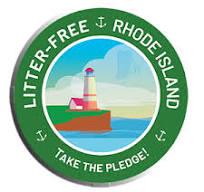What is Litter and How Can You Help Keep Rhode Island Litter-Free?

Litter includes waste that is intentionally improperly disposed, such as cigarette butts, food packaging, and other trash discarded by pedestrians and motorists. Additionally, litter also includes waste that is unintentionally (but improperly) disposed, such as trash from overflowing trash cans, unsecured loads that accidentally release trash from garbage trucks or pick-up truck beds, vehicle debris from accidents, or when there are not proper mechanisms in place to dispose of various items. Whether intentional or unintentional, litter negatively impacts community pride, tourism, and property values in Rhode Island and needs to be prevented.
Beyond aesthetics, litter detrimentally affects our environment, quality of life, and economic progress. It contaminates our roads, water bodies, soil, and air, inflicting irreversible harm on ecosystems. Wildlife frequently confuses litter for food or becomes entangled in it, resulting in injury or death. Preventing litter is easy but its removal from the environment and Rhode Island roadways poses a difficult and expensive challenge. Litter breaks down into smaller pieces such as microplastics, which can leach harmful chemicals into the environment, contaminating the food chain and drinking water, which poses risks to human health. This degradation of litter makes it difficult to remove and requires expensive equipment, increased labor costs, and can result in additional risks to both the environment and humans. Litter along our roadways can be a navigational hazard that leads to ponding of water and airborne materials that reduces the line of vision. Rhode Island is the Ocean State, and no one enjoys seeing litter and trash in our beautiful ocean or anywhere else in our communities.
Understanding litter's definition and its adverse effects empowers us to responsibly dispose of waste, ensuring it stays within our vehicles and off our roadways. Let's refrain from tossing items out of our vehicles, devise strategies to securely manage trash within our vehicles, and routinely check for waste before driving, particularly with open windows or sunroofs. Let's also exercise caution in securing items in truck beds to prevent litter from spreading. Together, we can ensure Rhode Island stays clean and beautiful.
MESSAGE TO THE READER
Read this Driver’s Manual carefully. It contains a wealth of information that you will need to know to be a safe and courteous driver. The information on the RI DMV Knowledge exam and the Driver Skills test is covered in this manual. Once you have obtained your driver’s license, keep this manual where you can find it easily and refer to it. Please read on . . .
PLEASE NOTE
Effective July 3, 2007, per Public Law 2006, Chapter 246, Article 7, Relating to Debt Management Act Joint Resolutions, Section 4, the Division of Motor Vehicles instituted a technology surcharge applicable to all DMV transactions for which a fee is typically charged. Effective July 1, 2013, Rhode Island licenses and motor vehicle registrations are subject to surcharges as part of the Transportation Investment and Debt Reduction Act of 2011. Please be advised that the fees may be subject to these surcharges.
PLEASE NOTE
A non-refundable fee and technology surcharge will be charged on all operator road skills tests conducted by the Division of Motor Vehicles. A road skills test may be scheduled at the time of the computerized knowledge exam or by making a Reservation online. Please refer to www.dmv.ri.gov for reservations, RI DMV locations and the most up-to-date fee table.
This manual is co-produced by Rhode Island Division of Motor Vehicles, the Community College of Rhode Island, Driver Education Program, the Rhode Island State Police, and the Rhode Island Department of Transportation as a guideline for the user to develop helpful procedures for safe and law-abiding driving skills. While the manual contains a great deal of useful information about state laws and driving procedures, this is not a legal document. For up-to-date changes in laws, fees, and procedures, log onto to www.dmv.ri.gov or www.rilin.state.ri.us.